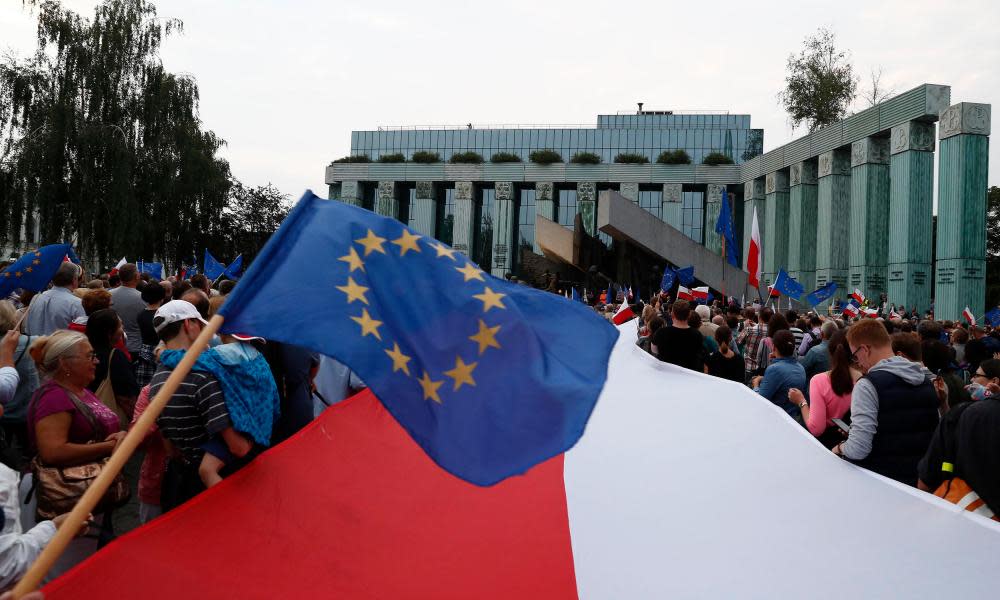The Observer view on Poland’s assault on law and the judiciary | Observer editorial

The decision by Poland’s upper house of parliament to give the government de facto control of the country’s highest court is a serious mistake with negative implications for Europe. The legislation compromises judicial independence and undermines confidence in the rule of law free from political interference. It deals a heavy blow to Poland’s far from robust post-communist democratic institutions. It is a staggering act of defiance of the EU, which explicitly opposed the measure. And it explodes the too-comfortable illusion, fashionable since Emmanuel Macron won France’s presidential election, that the dark forces of intolerant European nationalism and populism are in retreat.
The new law is one of several so-called reforms, proposed by the ruling rightwing Law and Justice party (PiS), giving ministers power over the appointment of judges and members of Poland’s supreme court. All 83 of the court’s current judges will be sacked unless retained by order of the justice minister. The government claims this will speed up judgments and break the grip on the legal system of a “privileged caste” of lawyers and judges. Large street protests preceded a debate in the lower house of parliament last Thursday. But the bill was approved by 235 to 192 votes. Now that the senate has also backed it, President Andrzej Duda, a PiS ally, is expected to sign it into law, although he still has time for second thoughts.
The PiS gained power in 2015 after unseating the Civic Platform government and has been a problem for Poland and Europe ever since. Despite winning only 37.6% of the vote, it proceeded to foist its narrow nationalistic, ideological and cultural outlook on the rest of the country as if it had obtained an overwhelming mandate.
Timothy Garton Ash, a seasoned observer of Polish affairs, described the PiS agenda as “systematic anti-liberalism with a seasoning of resentment and paranoia”. There was no question that an elected government had the right to implement its policies. “What it has no right to do is to dismantle or neutralise the institutions that allow an informed public to make [a] free choice, and that place essential checks and balances on the executive,” Garton Ash wrote.
Yet this is exactly what is happening now. A series of divisive and damaging controversies has ensued since the election. After nationwide women’s protests and an awkward debate in the European parliament last year, Jarosław Kaczyński, the PiS leader, backed away from legislation making virtually all abortions illegal – while saying he still agreed with it. There have been rows about threats to media freedom, what journalists call a “purge culture”, and the pro-government bias of state broadcasters. Poland is facing legal action by Brussels over its refusal to honour an EU agreement on relocating Syrian refugees. Now comes the bid to emasculate the judiciary.
Poland is often described as a proudly independent, conservative, predominantly Catholic country, where change comes slowly. But adherence to traditional values and healthy national self-respect can too easily be subverted and exploited by unscrupulous leaders.
Kaczyński’s anti-democratic instincts put him at odds both with the many Poles who want to build a forward-looking, integrated and tolerant country and with the European mainstream. Yet demonstrations are not enough. His authoritarianism poses an existential challenge to the autonomy of democratic institutions, such as parliament, the courts and civil service, that have yet to develop fully since the era of Soviet dominance ended in 1989. His regressive policies also challenge the EU itself in ways that cannot be ignored.
Poland’s opposition needs to get its act together. But so, too, does Europe. Last week’s message from Brussels was clear: scrap these “reforms” or face unprecedented ostracism. Frans Timmermans, the first vice-president of the European commission, acted tough, although appearances can be deceptive. The EU was “very close”, he said, to triggering article 7, a never-before-used sanction that allows a member state’s voting rights in the council of ministers to be suspended. The response from the PiS was defiant: Brussels can go whistle, as Britain’s foreign secretary might say. Poland’s government would not yield.
What should the EU do? Poland’s reputation as the bad boy of Europe, exceeding even that of Viktor Orbán’s Hungary, which is backing the PiS against Brussels, is well established. If the Polish government continues on its present course, the most obvious available option would be to cut financial support. Poland is by far the biggest beneficiary of EU cohesion funds. It is due to receive about €82.5bn (£74bn) in the 2014-20 budgetary period. It has profited enormously from EU membership since joining in 2004.
The idea that, if provoked, Poland might follow Britain out of the door is absurd. If Polish politicians continue to defy European norms, renege on binding commitments such as refugee quotas and ignore the views of fellow members, the consequences should be plain – and painful. Germany has floated proposals to freeze funds for countries that fail to meet EU rule-of-law standards. For the sake of its credibility and future cohesion, Europe must enforce a tough line with Kaczyński and the PiS.
Poland’s leaders should also be clear that, in a world where attacks on judicial independence are only too common, they must not look beyond Europe for support or justification. Such problems are not unexpected in China, Belarus or Iran. In the US, too, Donald Trump has behaved disgracefully in serially assaulting US judges. But despite his recent, cringe-making visit to Warsaw, when he echoed many of the chauvinistic ideas espoused by the PiS, Trump’s example is not to be emulated.
Europe stands for democracy. Where does Poland stand?

 Yahoo News
Yahoo News 
